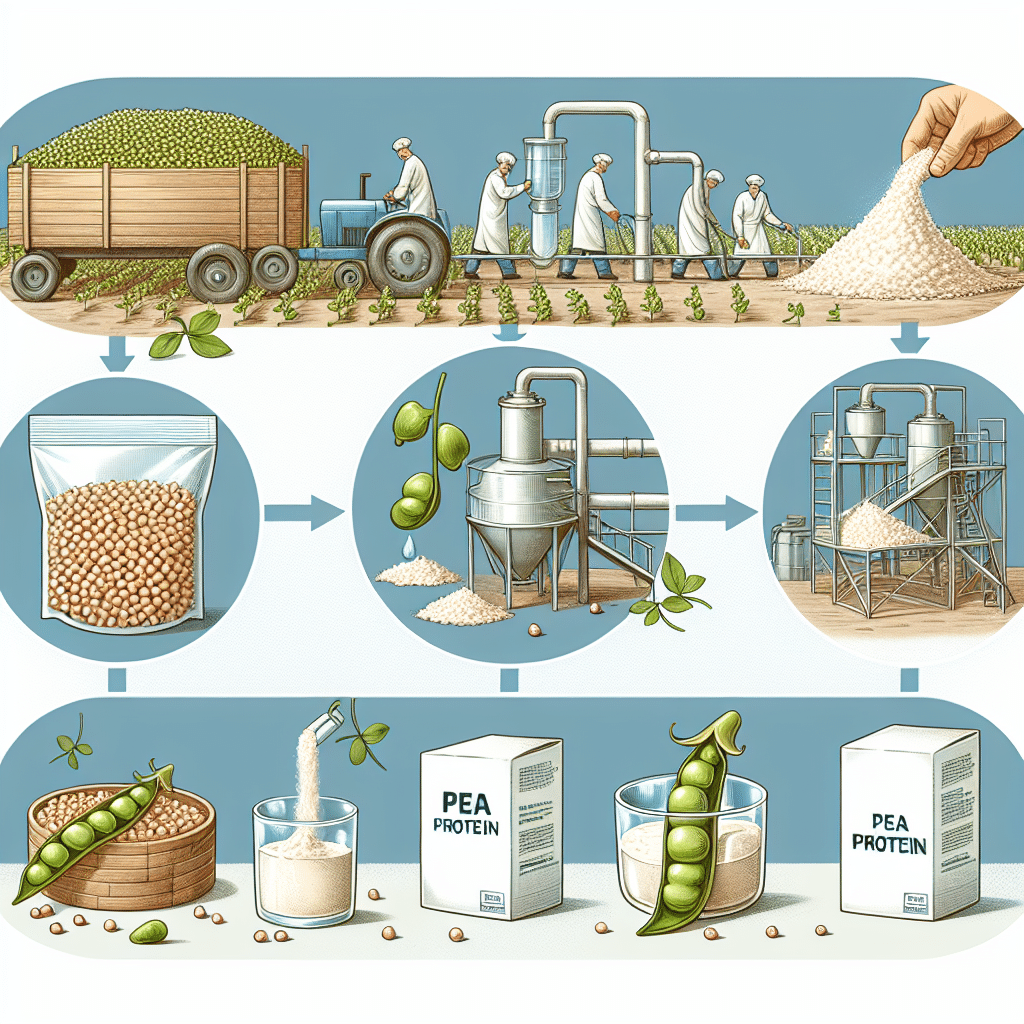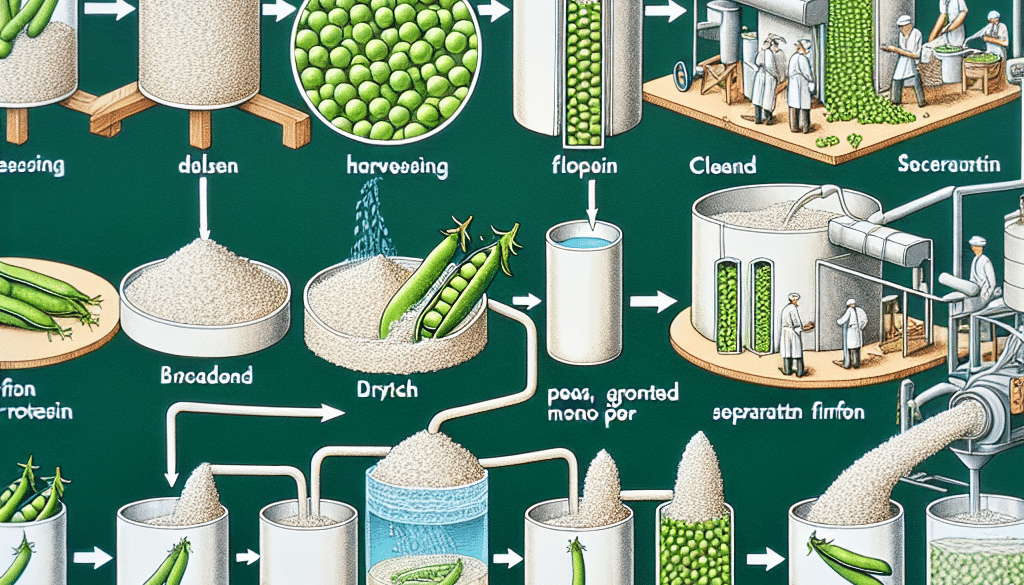Is Pea Protein Ultra Processed?
-
Table of Contents
- Pea Protein: Is It Considered Ultra-Processed?
- Understanding Pea Protein and Its Production
- Defining Ultra-Processed Foods
- Is Pea Protein Ultra-Processed?
- The Health Implications of Ultra-Processed Foods
- Pea Protein: A Nutritional Perspective
- Case Studies and Examples
- Environmental Considerations
- Conclusion: Balancing Processing and Nutrition
- Discover ETprotein’s High-Quality Protein Products
Pea Protein: Is It Considered Ultra-Processed?

As the demand for plant-based proteins continues to rise, pea protein has emerged as a popular alternative to animal-derived proteins. Its presence in a variety of food products, from protein shakes to meat substitutes, has sparked a debate about its processing level. This article delves into whether pea protein should be classified as ultra-processed and the implications of its processing on health and nutrition.
Understanding Pea Protein and Its Production
Pea protein is derived from yellow split peas and is a high-quality protein source that contains all nine essential amino acids. The process of making pea protein typically involves several steps:
- Drying and grinding the peas into flour
- Separating the protein from the fiber and starch through a water-based process
- Concentrating and purifying the protein
- Drying the protein into a powder form
This process, while it may seem extensive, is designed to isolate the protein component of peas for concentrated nutritional benefits.
Defining Ultra-Processed Foods
The term “ultra-processed” is defined by the NOVA classification system, which categorizes foods based on the extent and purpose of their processing. Ultra-processed foods are typically made from substances extracted from foods or synthesized in laboratories, and they often contain little, if any, intact whole foods. They are also characterized by high levels of sugar, fat, and salt, and the presence of additives like artificial colors, flavors, or stabilizers.
Is Pea Protein Ultra-Processed?
Whether pea protein is considered ultra-processed depends on the criteria used. While it undergoes processing to extract the protein from the peas, it does not necessarily contain the high levels of sugar, fat, salt, or artificial additives associated with ultra-processed foods. However, some argue that the extraction and purification process itself is enough to classify pea protein as ultra-processed.
The Health Implications of Ultra-Processed Foods
Consuming high amounts of ultra-processed foods has been linked to various health issues, including obesity, heart disease, and diabetes. These foods are often energy-dense, nutrient-poor, and can lead to overconsumption due to their palatability and convenience.
Pea Protein: A Nutritional Perspective
Pea protein, on the other hand, is recognized for its nutritional benefits. It is a rich source of iron and can be easily digested. Additionally, it is hypoallergenic and free from dairy, gluten, and soy, making it suitable for individuals with certain dietary restrictions.
Case Studies and Examples
Several studies have examined the effects of pea protein on health. For instance, a 2015 study published in the Journal of the International Society of Sports Nutrition found that pea protein promoted muscle thickness gains just as effectively as dairy-based whey protein in athletes. This suggests that pea protein can be a viable alternative for those seeking plant-based protein sources without compromising on performance or recovery.
Environmental Considerations
From an environmental standpoint, pea protein is often favored over animal-based proteins. Peas require less water and land to grow, and they have a lower carbon footprint. This makes pea protein a more sustainable choice for those concerned about the environmental impact of their food choices.
Conclusion: Balancing Processing and Nutrition
In conclusion, while pea protein undergoes processing to isolate its protein content, it does not fit the typical profile of an ultra-processed food laden with unhealthy additives. Its nutritional benefits and lower environmental impact make it a valuable component of a balanced diet, particularly for those seeking plant-based protein options. Consumers should consider the type of processing and the overall nutritional profile when evaluating pea protein products.
Discover ETprotein’s High-Quality Protein Products
If you’re looking for premium plant-based protein options, ETprotein offers a range of products that cater to various dietary needs. Their selection includes organic rice protein, clear pea protein, and other seed-based proteins, all characterized by a neutral taste and non-GMO, allergen-free attributes. With a commitment to quality and purity, ETprotein is a trusted supplier for industries across the globe.
About ETprotein:
ETprotein, a reputable protein and L-(+)-Ergothioneine (EGT) Chinese factory manufacturer and supplier, is renowned for producing, stocking, exporting, and delivering the highest quality organic bulk vegan proteins and L-(+)-Ergothioneine. They include Organic rice protein, clear rice protein, pea protein, clear pea protein, watermelon seed protein, pumpkin seed protein, sunflower seed protein, mung bean protein, peanut protein, and L-(+)-Ergothioneine EGT Pharmaceutical grade, L-(+)-Ergothioneine EGT food grade, L-(+)-Ergothioneine EGT cosmetic grade, L-(+)-Ergothioneine EGT reference grade and L-(+)-Ergothioneine EGT standard. Their offerings, characterized by a neutral taste, non-GMO, allergen-free attributes, with L-(+)-Ergothioneine purity over 98%, 99%, cater to a diverse range of industries. They serve nutraceutical, pharmaceutical, cosmeceutical, veterinary, as well as food and beverage finished product distributors, traders, and manufacturers across Europe, USA, Canada, Australia, Thailand, Japan, Korea, Brazil, and Chile, among others.
ETprotein specialization includes exporting and delivering tailor-made protein powder and finished nutritional supplements. Their extensive product range covers sectors like Food and Beverage, Sports Nutrition, Weight Management, Dietary Supplements, Health and Wellness Products, and Infant Formula, ensuring comprehensive solutions to meet all your protein needs.
As a trusted company by leading global food and beverage brands and Fortune 500 companies, ETprotein reinforces China’s reputation in the global arena. For more information or to sample their products, please contact them and email sales(at)ETprotein.com today.












